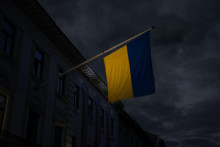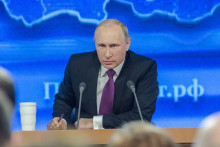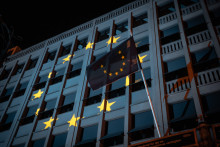According to Donnelly, the war is ‘inching into its third phase’. ‘Meaning that the war is spreading. Weapons and fighters are flowing from the West, Putin is seeking supplies from China, and military strikes are hitting West Ukrainian targets closer to NATO. Putin’s army is performing poorly. He’s already sacked eight of his generals and has now put his head of intelligence under house arrest. He definitely didn’t plan it this way.’
Intimidation
Still, the war is spreading, says the UT researcher. ‘Putin has sheer numbers, a willingness to attack civilians, and is now starting to use more missiles instead of troops, especially closer to the EU. Moreover, he consciously chose to attack the base near the Polish border with ballistic missiles, knowing there were resources from both the NATO and OSCE there, the very organisation that’s observing the agreements that were made between Russia and Ukraine in 2014.’
To Donnelly, it’s yet another prime example of how Putin works. ‘I’ll repeat what I said last week: Putin says what he wants and follows up on it. He doesn’t hesitate to threaten attacks against the West to isolate Ukraine, including weapons of mass destruction, both chemical and nuclear. Still, I don’t expect him deploying major nuclear weapons, not for the next week or so. Knowing that he directly asked the Chinese for help means he’s planning for conventional rather than nuclear warfare in the short term. That should help people sleep a bit better at night.’
Independence
Knowing that the base near the Polish border was attacked, The ‘West’ can expect more direct threats from Putin, says the UT researcher. ‘His army is shit, but his missiles are good, and his nuclear and chemical weapons are also a real threat. Should a ballistic missile hit NATO territory, know that that’ll be on purpose. Those missiles are so accurate, they don’t miss.’
The threat again begs the question of how to deter Putin properly from further attacks, and how Europe’s strategic autonomy – or current lack thereof –contributes to that, says Donnelly. We can see that the West failed to deter Putin from starting this war and spreading it. ‘We’ve dropped the ball by being too soft. If Europe wants to contain Putin’s aggression,– even if a Trump-like candidate is in the White House in 2025 – it needs to be more assertive, and it should work on its military, technological and resource independence. We are in a war and we need to act like it.’
Combat clouds
There are a lot of layers and moving parts when it comes to this so-called strategic autonomy. Donnelly shares his thoughts on the most pressing matters. ‘First and foremost, let’s talk about military autonomy. This is moving quickly, but that means using American instead of European hardware. There’s been a big shift, this week, with Germany deciding to buy F35 fighter jets from the US, instead of investing in FCAS – the collaboration with France and Spain. So Germany chose to invest in a short-term solution instead of a long-term one. Which is a smart move, should the war suddenly spread throughout Europe. But the shift means that Germany, for the time being, does want to stick to the current superior American technology, which is easy to maintain, reload and restore. Instead of going for full European autonomy, you see it hedging a bit more with this development.’
In the long term, Donnelly sees European countries working on so-called ‘combat clouds’. ‘A student of mine wrote an absolutely astonishing master thesis about this, a few years ago. A combat cloud integrates all forces from the land, sea and air – even below the surface and in space. That is the EU strategy, a collaborative combat cloud. Instrumental for the success of these combat clouds are interconnected drone swarms, that can play a pivotal role in identifying and eliminating targets. It’s basically a kill chain, similar to a supply chain. Now, Russia knows this, so they will do their best to gain the upper hand in electronic warfare: ensuring that communication within this kill chain cannot take place by jamming the systems, similar to a DDoS attack on a website.’
Ownership and control
That brings Donnelly to another layer of strategic autonomy: technology. ‘Specifically chips. You need chips that are so powerful and with such a big capacity that they’re practically immune to jamming. The EU is taking steps in this regard, with the European Chips Act, which in the meantime also ensures more independence from China – again a smart move when it comes to strategic autonomy.’
And chips are just a small piece of the puzzle, Donnelly continues. ‘Strategic autonomy starts with military independence, but it has knock-on effects. Besides chips, think of industrial capacity, financial systems, a robust 5G communications network, ample health care capacity and even the housing of refugees from Ukraine is important in this regard – either by having clear agreements between countries or supplying Poland, the country that’s taking in the most refugees, with financial aid. Yes, even solving housing issues are part of creating ownership and control.’
In collaboration with Studium Generale, U-Today is hosting a Q&A with Shawn Donnelly about the current situation in Ukraine on March 31. You can find the details here.







